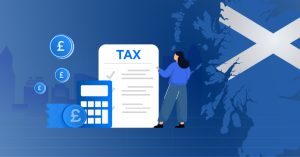The UK tax system was changed on April 6, 2025, when the government replaced the remittance basis for non-domiciled individuals with a new Foreign Income and Gains (FIG) regime. This new tax framework uses residency, not domicile, to determine how UK residents report and pay tax on income earned abroad.
If you are a UK resident with overseas income, understanding these new rules is crucial for compliance and financial management. This guide explains the eligibility criteria, claims process, and what this new tax regime means for you and your business.
Do I Pay Foreign Income Tax?
The new FIG regime applies to eligible new residents. To qualify, you must meet two conditions:
- You are a UK tax resident in the current tax year.
- You were not a UK resident for the 10 consecutive years preceding your return.
If you meet these criteria, you can claim tax relief on your foreign income and gains for up to four consecutive tax years, starting from your first year of UK tax residency.
What If You Became a Resident Before April 6, 2025?
If you’ve been in the UK for less than four years, you can still claim relief under the new regime for the time remaining in that period.
Example:
Consider this scenario:
- You became a UK resident at the beginning of the 2023/24 tax year. This marks your first year of UK residency.
- When the new tax rules come into effect for the 2025/26 tax year, you will be in your third year of residency.
This means you can claim tax relief for the 2025/26 and 2026/27 tax years, aligning with your third and fourth qualifying years.
An important detail to note: These four years must be continuous. If you spend time outside the UK during this period, you cannot claim relief for the tax years you are away. However, you can resume claiming for any remaining qualifying years once you return to UK tax residency.
How the New FIG Regime Works
Old Rules: Under the old remittance basis, non-domiciled individuals only paid UK tax on foreign income they brought into the UK.
Key part of the new system is making a claim through your Self Assessment tax return. Unlike the old system, you now have the flexibility to make three separate claims, and you can choose
Foreign income and gains for up to four years. Plus, you can bring this money into the UK foreign income and gains for up to four years. Plus, you can bring this money into the UK. There four years must be continuous. If you spend time outside the UK during this period, you cannot claim relief for the tax years you are away. However, you can resume claiming for any remaining qualifying years once you return to Uk tax residency.
New Rules: The new FIG regime changes this. If you qualify, you will not pay UK tax on your foreign income and gains for up to four years. Plus, you can bring this money into the UK without any tax charges.
A key part of the new system is making a claim through your Self Assessment tax return. Unlike the old system, you now have the flexibility to make three separate claims, and you can choose any combination of them each year:
- A foreign income claim: This applies to eligible foreign income, such as profits from an overseas property business or dividends from non-UK companies.
- A foreign employment election: This is for income from foreign employment.
- A foreign gain claim: This covers capital gains from foreign assets.
This flexibility allows you to be strategic about which income and gains you claim relief on. You are not required to claim relief on all your foreign income sources.
Check the full lists of income and gains you can claim here.
Reporting Foreign Income with SA106
When claiming relief under the new FIG regime, you must still report your foreign income to HMRC. The SA106 form, a supplementary page of the Self Assessment tax return (SA100), is used for this purpose. It allows you to declare income or gains from overseas sources, such as interest from foreign bank accounts or rental income from property abroad.
If you have paid tax on this income in another country, the SA106 form is also where you claim Foreign Tax Credit Relief (FTCR) to avoid being taxed twice on the same income. You can find more detailed guidance on filling out this form in our blog, "SA106: Your Guide to Foreign Income Tax".
How Much Foreign Income is Tax-Free in the UK?
Under the new FIG regime, qualifying individuals can receive tax-free status for all eligible foreign income and gains for up to four years. This marks a notable shift from previous rules, which often imposed a significant charge for non-domiciled individuals to use the remittance basis, particularly for those residing in the UK long-term.
What About Small Amounts of Foreign Income?
Under previous rules, non-domiciled taxpayers with less than £2,000 of unremitted foreign income weren't required to report it to HMRC. However, this rule changes from April 6, 2025.
Under the new UK tax system, if you are a UK resident with any amount of foreign income and you file a Self Assessment tax return, you must report it. This ensures greater transparency and requires all UK residents to declare their worldwide income, regardless of the amount.
Allowances You Will Lose When Claiming
Choosing the new FIG regime has implications. By claiming under this regime, you'll forfeit your eligibility for certain UK tax-free allowances for that tax year. These include:
- The Personal Allowance for Income Tax (£12,570 for 2024/25).
- The annual exempt amount for Capital Gains Tax.
- The Blind Person's Allowance.
- Tax reductions from the Marriage Allowance or Married Couple's Allowance.
It's crucial to compare the tax savings on your foreign income against the value of these allowances. For individuals with substantial foreign income, the benefits of the FIG regime will likely exceed the loss of these allowances.
A Note for Business Owners Abroad
The new rules could affect overseas business owners with investments or financial interests in the UK.
Normally, as a non-UK resident, you only pay tax on UK income. But if your residency changes or you spend more time in the UK, you might fall under the UK tax system.
The first step? Learn about the Statutory Residence Test (SRT) to figure out your tax status. If you’re considered a UK resident, the new FIG regime might give you tax relief on foreign business profits for the first four years. It’s a great chance—if you qualify!
Navigating the New Tax Landscape
The new Foreign Income and Gains regime changes how the UK taxes international individuals, offering potential tax advantages for newcomers. However, with new reporting requirements and key decisions to make, it’s crucial to understand your options. Need help navigating this? Debitam’s experts are here to simplify the process and guide you every step of the way! Let's have a chat, don't let the new rules intimidate you!













